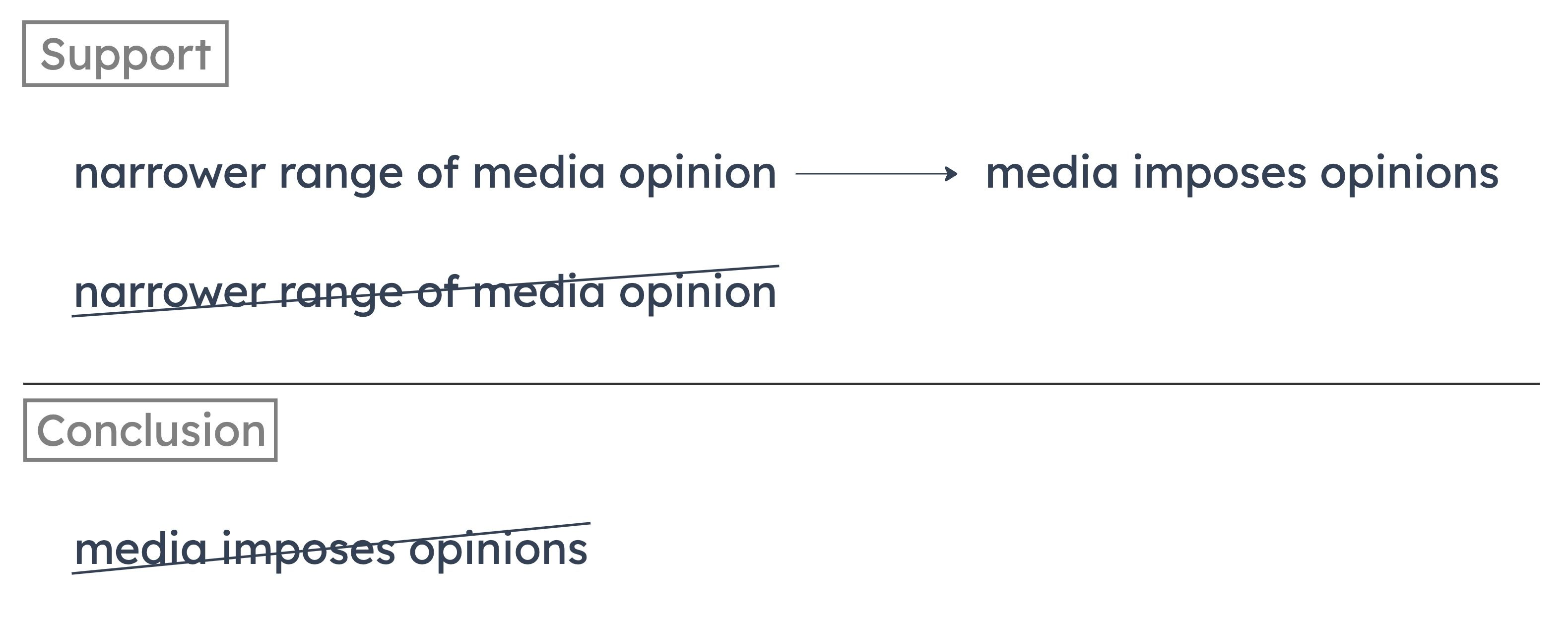LSAT 119 – Section 4 – Question 14
LSAT 119 - Section 4 - Question 14
June 2005You need a full course to see this video. Enroll now and get started in less than a minute.
Target time: 1:38
This is question data from the 7Sage LSAT Scorer. You can score your LSATs, track your results, and analyze your performance with pretty charts and vital statistics - all with a Free Account ← sign up in less than 10 seconds
| Question QuickView |
Type | Tags | Answer Choices |
Curve | Question Difficulty |
Psg/Game/S Difficulty |
Explanation |
|---|---|---|---|---|---|---|---|
| PT119 S4 Q14 |
+LR
+Exp
| Flaw or descriptive weakening +Flaw Conditional Reasoning +CondR | A
1%
151
B
18%
158
C
72%
163
D
2%
151
E
7%
156
|
141 151 162 |
+Medium | 145.1 +SubsectionEasier |
J.Y.’s explanation
You need a full course to see this video. Enroll now and get started in less than a minute.
Summarize Argument: Counter-Position
The author concludes that the media does not have excessive power to impose opinions, contrary to the view of some critics. His support is that, if the media purveyed an overly narrow range of opinion, that would be sufficient for it to impose opinions. But it doesn’t purvey an overly narrow range of opinion.


Identify and Describe Flaw
This is the cookie-cutter flaw of confusing sufficiency and necessity. The author argues that, because a sufficient condition (overly restricted opinion) isn’t true, its necessary condition (imposing opinions) couldn’t be true. This is flawed reasoning, because only the absence of a necessary condition (not a sufficient condition) can tell you that something can’t be true.
Consider the analogous argument: “If this food was an orange, it would be a fruit. It’s not an orange, so it can’t be a fruit.” This is fallacious, because even though being an orange is enough to make something a fruit, not all fruits are oranges.
Consider the analogous argument: “If this food was an orange, it would be a fruit. It’s not an orange, so it can’t be a fruit.” This is fallacious, because even though being an orange is enough to make something a fruit, not all fruits are oranges.
A
The argument launches a personal attack against the critics rather than addressing the reasons they present in support of their claim.
This is the cookie-cutter flaw of ad hominem. It isn’t applicable here, because there is no personal attack; the author provides a substantive argument.
B
The argument takes for granted that the media give at least as much exposure as they should to a wide range of opinion on the important issues of the day.
The author would be taking this for granted if he were to assume it was true without actually stating it. He explicitly says that it is true, so he isn’t taking it for granted.
C
The argument takes for granted that if the truth of one claim implies the truth of a second claim, then the falsity of the first claim proves the falsity of the second claim.
This is the cookie-cutter flaw of confusing necessary and sufficient conditions (see diagram above). The author argues that a sufficient condition doesn’t apply, so its necessary condition doesn’t apply either. But that doesn’t follow logically.
D
The argument, instead of providing adequate reasons in support of its conclusion, makes an appeal to popular opinion.
The author’s conclusion is about people’s opinions, but he doesn’t appeal to popular opinion. That would be if he’d said that many people believe this conclusion is true, so therefore it must be true.
E
The argument takes for granted that it is desirable for a wide range of opinion on the important issues of the day to receive media exposure.
The author never says that it is desirable to have a wide range of opinion—he only says that there is in fact a wide range of opinion.
Take PrepTest
Review Results
LSAT PrepTest 119 Explanations
Section 1 - Reading Comprehension
- Passage 1 – Passage
- Passage 1 – Questions
- Passage 2 – Passage
- Passage 2 – Questions
- Passage 3 – Passage
- Passage 3 – Questions
- Passage 4 – Passage
- Passage 4 – Questions
Section 2 - Logical Reasoning
- Question 01
- Question 02
- Question 03
- Question 04
- Question 05
- Question 06
- Question 07
- Question 08
- Question 09
- Question 10
- Question 11
- Question 12
- Question 13
- Question 14
- Question 15
- Question 16
- Question 17
- Question 18
- Question 19
- Question 20
- Question 21
- Question 22
- Question 23
- Question 24
- Question 25
Section 3 - Logical Reasoning
- Question 01
- Question 02
- Question 03
- Question 04
- Question 05
- Question 06
- Question 07
- Question 08
- Question 09
- Question 10
- Question 11
- Question 12
- Question 13
- Question 14
- Question 15
- Question 16
- Question 17
- Question 18
- Question 19
- Question 20
- Question 21
- Question 22
- Question 23
- Question 24
- Question 25
- Question 26
Leave a Reply
You must be logged in to post a comment. You can get a free account here.